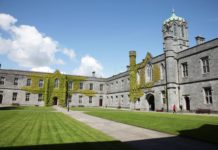The late Workers’ Party president Tomás Mac Giolla argued that without an end to economic exploitation there can be no freedom.
Addressing the Sinn Féin Ard Fheis of January 1970, Mac Giolla said: “Our objective is the re-conquest of Ireland from the ground landlords, the river barons, the speculators, the cartels and the monopolies and the struggle against them will now be intensified. If needs be, we must be prepared to win back our country farm by farm, river by river, mine by mine, shop by shop, and factory by factory.”
This determination to end economic exploitation would later be matched by his commitment to represent the people of Ballyfermot, first as a councillor and in the Dáil between 1982 and 1992 as a TD for the Dublin West Constituency.
X Factor singer and a Ballyfermot local Mary Byrne tells a story of what Mac Giolla meant by political representation when he saved her from eviction by telling baliffs that they had the wrong house.
For Sean Boland, Workers Party Organiser for Ballyfermot, this sums up Tomás Mac Giolla.
“He helped everybody, even people who never voted for him. His office, in Ballyfermot Drive, was packed every day. Housing was a huge issue. Halting evictions and campaigning for housing provision were always on the agenda.”
Boland describes how Mac Giolla’s work is still recalled by many people. “People to this day talk about Tomás.  Everybody knew him. He took a strong stance against corruption, and for fair planning. But he is best remembered for the way he treated people. He tended to take any infringements on people’s rights personally. He was extremely determined in his work.”
Everybody knew him. He took a strong stance against corruption, and for fair planning. But he is best remembered for the way he treated people. He tended to take any infringements on people’s rights personally. He was extremely determined in his work.”
In 1992, Dublin West boundaries was redrawn. According to Workers’ Party President Mick Finnegan, the loss of key parts of Ballyfermot where Party support had been strong made the election a tough fight. Development interests, keen to push forward with their plans for the Liffey Valley shopping centre, launched a huge campaign to unseat Mac Giolla, who had been an outspoken opponent of “developer first” planning.
Mac Giolla lost out to Fianna Fáil’s Liam Lawlor by just 59 votes in the 1992 general election, bringing an end to his parliamentary career. MacGiolla later wrote to the Flood tribunal seeking an investigation into the role of George Redmond, official supervisor at the count and a close associate of Lawlor. Redmond was later jailed for corruption.
Mac Giolla remained a Representative for Ballyfermot on Dublin corporation until 1998, serving as Lord Mayor of Dublin in 1993.
The Ballyfermot branch of the Workers’ Party is still to the fore in left wing political activity in the area. The branch is currently heavily engaged in the national campaign to defeat the household charge. Anyone interested in getting involved in the branch can contact the James Larkin cumann on Facebook.
Memorial and Seminar
Tomás Mac Giolla died on the 4th February 2010. A memorial headstone, commmissoioned by his wife Maire Bhean Mhic Giolla, was unveiled to honour the late WP president at 3.00 p.m. on Saturday, 15th October, 2011 in Palmerstown Cemetery, County Dublin.
The weekend had special significance for Tomás as it was on the 14th October that the Society of United Irishmen was founded in Belfast in 1791. A seminar was held on the evening of the 15th October to commemorate the life and legacy of Comrade Tomás Mac Giolla and to officially launch the Tomás Mac Giolla Centre for Citizenship and Reconciliation.
Article published in LookLeft Vol.2 No.8





